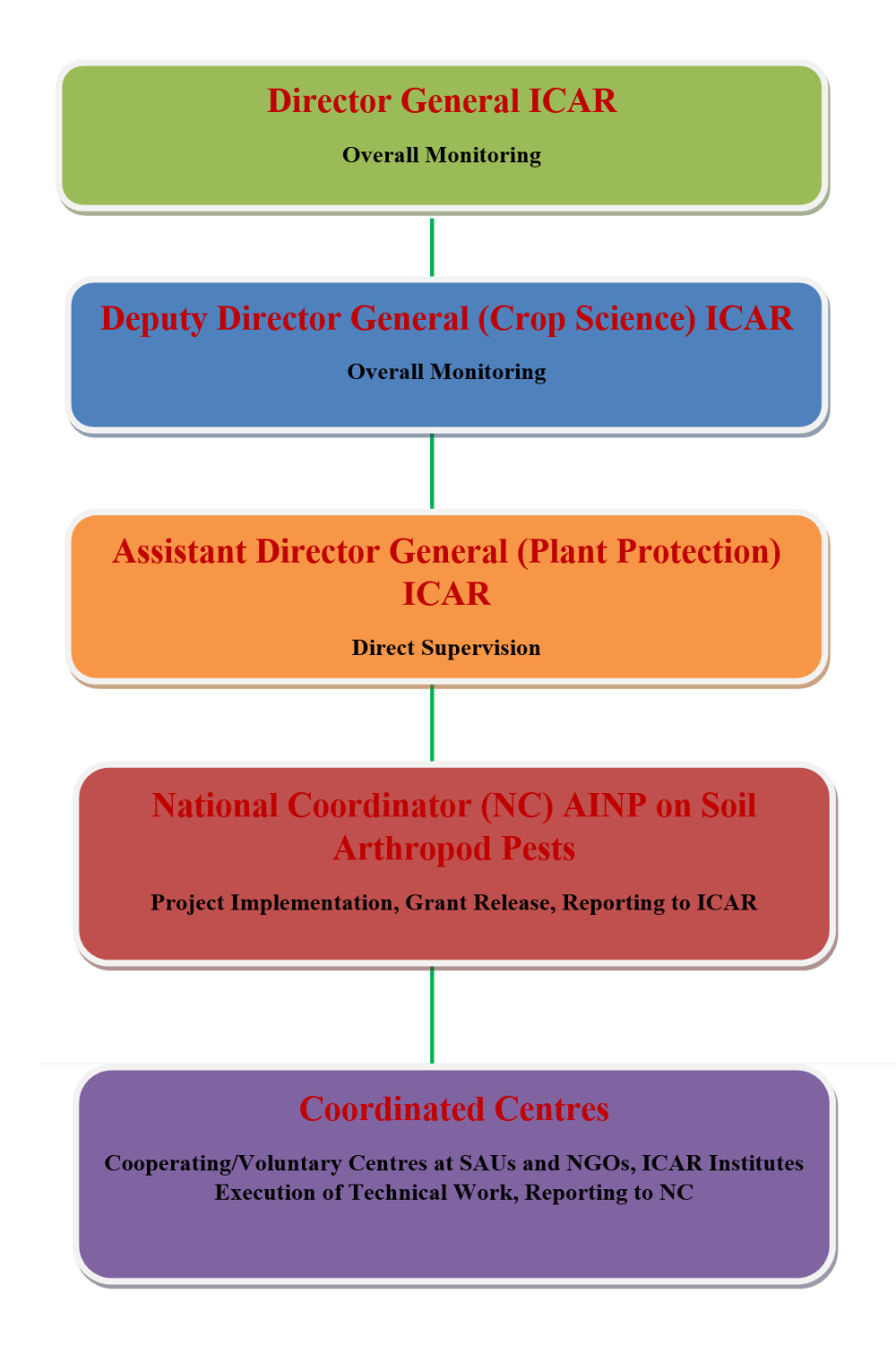
+91 141 2723845









Realizing the yield losses inflicted and seriousness of white grubs problem in several agricultural crops, the Indian Council of Agricultural Research started the “All India Coordinated Research Project on white-grubs” in 1982. In EFC Meeting held during 2014, the name of the project changed to “All India Network Project on Soil Arthropod Pests". With new aspiration and drive to coordinate location-specific research on soil arthropod pests management, now the project with sanctioned strength of small numbers of scientists to undertake the research work over a larger agro-ecological area three volunteer centres, Almora (Uttarakhand), Ghaziabad (Uttar Pradesh) and Kolhapur (Maharashtra) are included besides the main centres viz., RARI, Durgapura (Rajasthan), AAU, Jorhat (Assam), UAS, Bengaluru (Karnataka), CSK HPKV, Palampur (Himachal Pradesh) and JAU, Junagadh (Gujarat).

To develop simple, economical, safe and practical integrated technology for the management of white grubs and other soil arthropod pests under different agro climatic conditions and cropping systems in Pan India.



| Designation | Number of Positions |
|---|---|
| Network Coordinator | 1 |
| Scientific Staff | 11 |
| Technical Staff | 2 |
| Administrative Staff | - |
| Supporting Staff | 1 |
| Total | 15 |
| S. No. | Name | Period |
|---|---|---|
| 1 | Dr. CPS Yadav | 01.11.1983 to 31.10.1999 |
| 2 | Dr. V. K. Shinde | 01.11.1999 to 31.01.2001 |
| 3 | Dr. Vikram Singh | 01.02.2001 to 31.12.2002 |
| 4 | Dr. R.B.L. Gupta | 01.01.2003 to 30.11.2003 |
| 5 | Dr. P.C. Jain | 01.12.2003 to 31.08.2004 |
| 6 | Dr. J.N. Vijayvergia | 01.09.2004 to 21.07.2005 |
| 7 | Dr. Y.S. Mathur | 22.07.2005 to 30.11.2010 |
| 8 | Dr. Ashok Bhatnagar | 01.12.2010 to 17.07.2011 |
| 9 | Dr. Swaroop Singh | 18.07.2011 to 07.01.2015 |
| 10 | Dr. Ashok Bhatnagar | 08.01.2015-30.06.2016 |
| 11 | Dr. V.K. Agrawal | 01.07.2016 to 30.0.2017 |
| Plan | Number of Centres | Budget (Rs. In Lakhs) | % Change from the Previous Plan | ||||
|---|---|---|---|---|---|---|---|
| Cooperating Centres | Voluntary Centres | Total | Allocated | Utilization | % of Utilization | ||
| - | - | - | - | - | - | - | - |

The soil arthropod pests like, white grubs, termites, cutworms, root borer, wireworms, red ants, crickets, and phytophagous snails have become increasingly difficult pests throughout India with their increasing damage every year as evidenced by the several outbreaks that occurred over large areas during the recent past. Almost all field, horticultural and plantation crops are severely affected from this group of pests and sometimes, cause 100% of crop damage compelling farmers for uprooting of the crop.
The ICAR-AINP on Soil Arthropod Pests was launched in 1983 to conduct research for formulating long term and short-term strategies of management of soil arthropod pests. The major emphasis under this project has been given to find out solutions for the management of soil arthropod pests by using label claim pesticides. However, in the recent past, it has been realized that the chemical control of soil arthropod pests has been becoming ineffective due to development of resistance in target pests and other factors related to pest behaviour. Therefore, the other options for the management of soil arthropods pests are being explored under the project for the last few years, by integrating host trees spraying and using light traps and pheromone traps for beetles’ control and IPM approach including bioagents and botanicals for white grub control.
The bioagents are emerging as important tool to find out long term solutions for the management of soil arthropod pests. Application of bio-agents from known sources, native strains of Entomopathogenic Nematodes (EPNs) and Entomopathogenic fungi (EPFs) have been found to be very effective in IPM approach for the management of soil arthropod pests. The Scientific team of AINP ON SAP has made remarkable progress in development of technologies; isolation, identification and evaluation of native strains of natural enemies of soil arthropod pests. A set up of mass multiplication technology for EPN in Ghaziabad centre and for EPF in Bengaluru centre is developed and a wide range of management strategies (cultural, microbial and pheromonal etc.) have already realised in the project and to be adopted for managing them in view of their damage potential, cryptic life style (as they are underground most of the time) and much-to-be understood biology. That’s why this project is both economically and ecologically very viable and has a separate identity because no other institute or organisation is engaged in such type of research in India.
Social engineering now include a wider range of communication and learning activities are being organized for rural people by scientific team from different disciplines of agriculture. The application of scientific research on soil arthropod pest management and new knowledge to agricultural practices through farmer education carried out by each centre of AINP ON SAP throughout the year. AINP ON SAP scientific team organizes meeting with NGO’s, SHGs for the transfer of proven technologies to the farmers’ field and other stakeholders throughout the year, and thousands of beneficiaries benefitted from them.
In the Public-private partnership (PPP) mode, AINP-SAP takes up industry sponsored trials for generation of crop loss data due to soil arthropod pests. As a part of human resource and skill development initiative, AINP-SAP conducts refresher training programmes on soil arthropod pests management for project scientists and other researchers from across the country. Early advisory and awareness is issued for soil arthropod pests management among the farmers and the general public through participation in Krishi Vigyan Kendras (KVKs), Krishi Vigyan Melas, Mera Gaon Mera Gaurav (MGMG) and the media.
I wish to thank Dr. Himanshu Pathak, Secretary (DARE) and Director General (ICAR), Dr. T. R. Sharma, DDG (Crop Science), and Dr. S. C. Dubey, ADG (PP&B) for their guidance and support. I am also grateful to all the scientists and staff members associated with the project from across the country for their valuable contribution to the project. I hope information on soil arthropod pests made available in the project website will be of immense help to the researchers and the farmers’ community facing the problem of soil arthropod pests’ infestation in different crops and different climatic zones of pan India.
Dr. Arjun Singh Baloda
Network Coordinator
AINP on Soil Arthropod Pests
ICAR-RARI, Durgapura, Jaipur